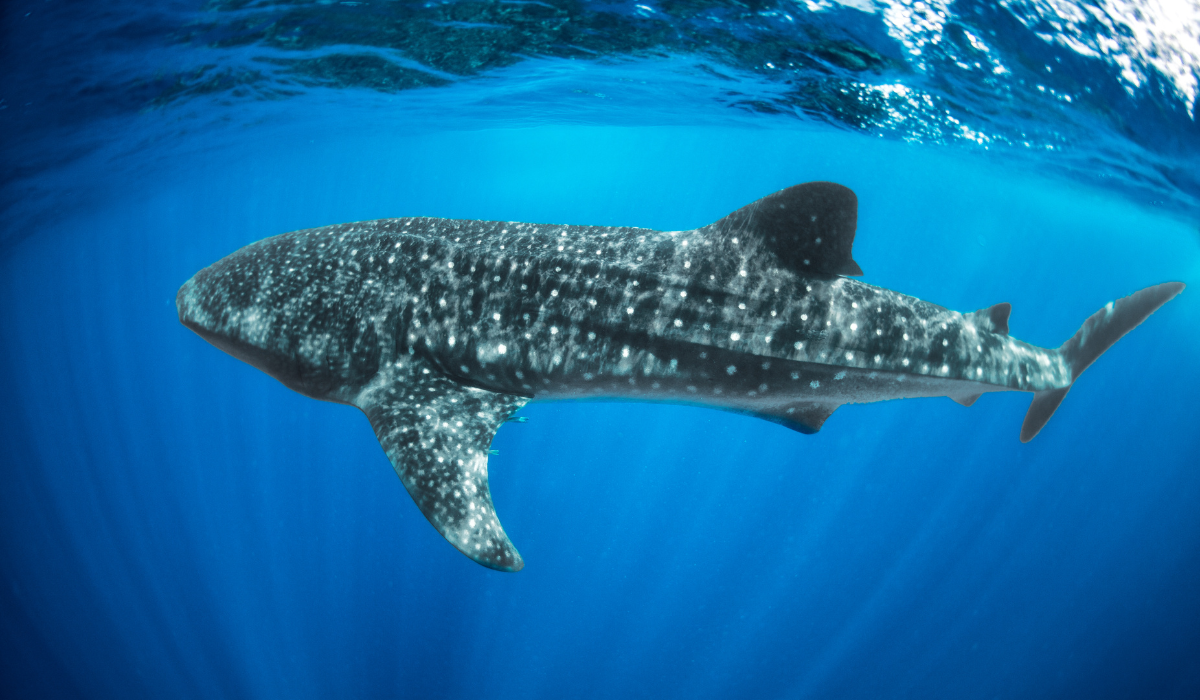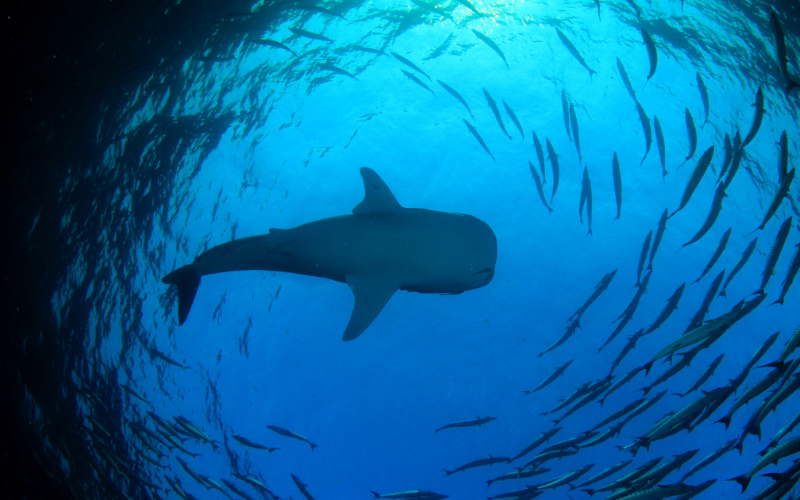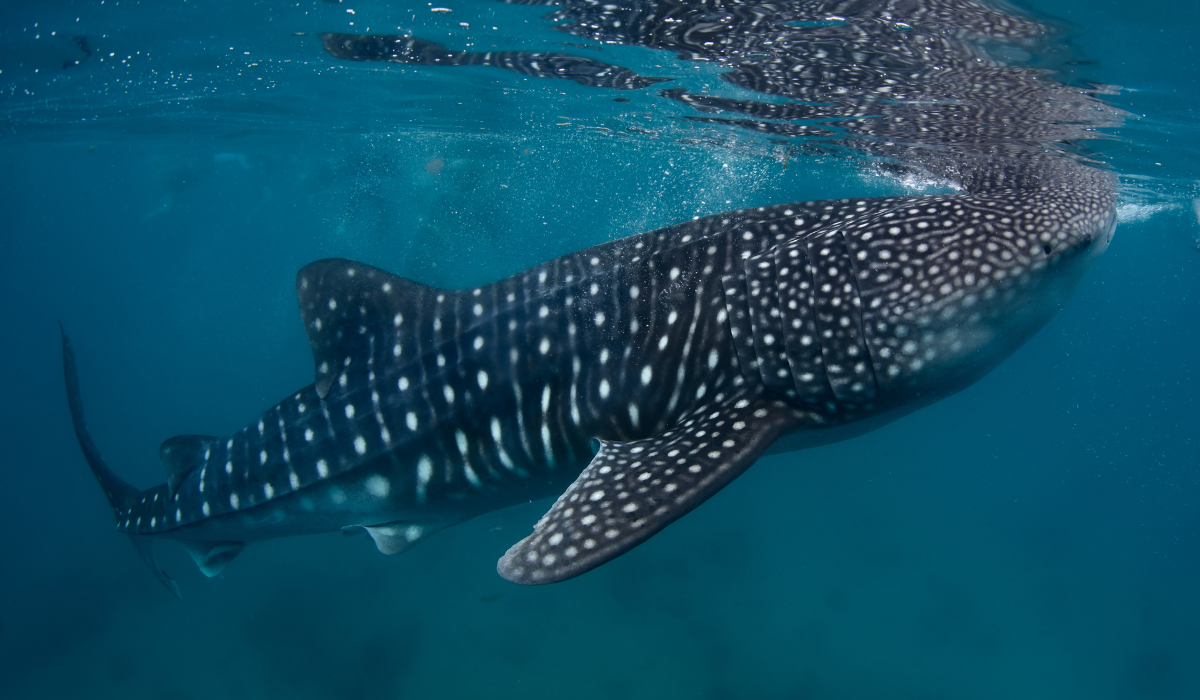
One of the most unforgettable things to do in Baa Atoll, a UNESCO Biosphere Reserve in the Maldives, is to swim with one of nature’s most beautiful sea beasts – the magnificent, mesmerising whale shark.
The Nautilus Maldives’ resident marine biologist, Emily Wilson, leads our free-spirited excursions to Hanifaru Bay – one of the few marine protected areas in the world where you can swim with these creatures. Emily recently returned from an exhilarating visit to the Maldives Whale Shark Research Programme (MWSRP) team while they were stationed in the Baa Atoll, and in this last part of our whale shark story, she shares more on this largest of fish species, as well as what you can expect from an up-close encounter.
“Whimsical Whale Sharks – the Gentle Giants of the Open Ocean” (Part 4 of 4)
Quality over Quantity
The whale shark (Rhincodon typus), adorned with polka dots and stretching the length of a bus, is the world’s largest fish. A record-breaking ocean giant, the largest individual on scientific record reached a triumphant 20 metres in length. And, fitting for a species of gargantuan size, recent research predicts the whale shark can live up to 130 years old.
Baby Sharks
Although little is known about whale shark reproduction, it is predicted they reach sexual maturity after 25 years, at a size of eight to nine metres. They are ovoviviparous, meaning shark pups hatch from eggs inside the maternal body and the offspring are born free swimming.
The majority of our understanding of whale shark reproduction comes from a single specimen fished in Taiwan in 1995; the female was carrying over 300 eggs all at different developmental stages. Scientists believe the female shark can store a male’s sperm and fertilise her eggs at will. As such, this makes it very difficult to estimate the length of a mother whale shark’s gestation period.
Even from infancy, a baby whale shark is cryptic, with the first years of their lives described by researchers as the “lost years”. Upon birth, the pups measure around 45–60cm, with many not seen again until they are about 3–4 metres long – sparking curiosity as to where the baby sharks spend their nursery years.

Into the Abyss
Whale sharks are phenomenal divers, descending to depths far beyond light’s reach. One tagged individual was recorded at a depth of 1,928 metres! But what makes deep diving advantageous to the shark is yet to be discovered, and due to the limitations of tagging devices, this part of their lives is mostly undocumented.
Plankton tend to shelter at depths between 100–200 metres in an area known as the oxygen minimum zone, an unsuitable habitat for many organisms that predate on them. Whale sharks, however, are perfectly equipped with an oil-filled liver and other physiological adaptations to prepare them for such voyages; hence, they may be taking advantage of the deep sea buffet.
As whale sharks are unable to control their body temperature internally, they seek out warmer surface waters after long, deep dives. During this period of thermoregulation (warming up), the sharks can be impaired physically and cognitively, which explains their sluggish behaviour and slow-cruising swimming style when observed in shallow waters.
Crafting a Meaningful Interaction
Solitary by nature, whale sharks are often observed alone. Only during mass feeding events, where plankton are plentiful, are whale sharks seen in close proximity.
Chloe Darwin of the MWSRP advises that during a wild encounter, it’s best to avoid the sensitive areas of the shark. All sharks have a developed sensory system to detect electric fields through electroreceptors embedded along their nose region (called the Ampullae of Lorenzini). She explains: ”Approaching a whale from the front or obstructing its path can cause the whale shark to steer away from you, often ending the interaction.” Similarly, the whale shark is sensitive to those approaching its fragile ventral side (stomach).
A whale shark will also show its displeasure by rolling onto its side, presenting its back to the threat – a behaviour known as “banking”. Chloe adds that you can further read the behaviour of a whale shark by observing the eye: ”If a person gets too close for comfort, they may witness the shark’s eye retract a few millimetres.” These extreme protective features indicate the importance of vision for the whale shark to evaluate its environment, contradictory to past assumptions that they depend significantly on other senses such as olfaction (smell).

Learn more about the whimsical whale shark in our previous blog posts, and for a totally immersive – and once-in-a-lifetime – learning experience, plan a whale shark excursion with us.
The Nautilus is just a 15-minute luxury yacht ride from Hanifaru Bay in Baa Atoll, a UNESCO Biosphere Reserve, one of the very few places in the world where whale sharks congregate to mate.
Witness these majestic creatures for yourself. Get in touch at [email protected] or talk to us at +960 730 98 18 to begin crafting your Nautilus journey.
